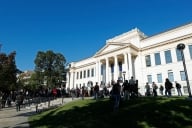You have /5 articles left.
Sign up for a free account or log in.

Manhattan Theater Club
As The Niceties opens, a professor is offering a detailed critique of writing issues in a draft of a paper turned in by one of the students in her history course. The professor, Janine, has clearly spent real time with the draft and wants to help, offering explanations about a particular missing comma and the importance of parallelism. Zoe, her African American student, is appreciative, while also checking her mobile phone to make plans to meet up with friends when the conference is over.
It turns out that Janine is just starting her critique, explaining that she takes seriously her obligation to teach writing, even if that's not her discipline. When meeting with students about papers, she says, she starts with writing and then proceeds to the rest. She questions the central thesis of Zoe's paper. And it soon becomes apparent that this student-professor meeting at an elite liberal arts college in the Northeast is not going to end quickly or civilly.
Janine is an expert on the history of revolutions, and she views the American revolution as exceptional in that it established a democracy and also as exceptionally good in that it avoided the mass violence and anarchy of revolutions in France, Russia and elsewhere. Zoe's paper argues that the United States avoided a radical revolution because of the common interests of wealthy and poor white people in preserving slavery. So the nature of the American Revolution is not something of which to be proud, she argues. In fact, the revolution perpetuated oppression, she says.
This horrifies Janine, who questions where the primary source materials are that would conclusively show this to be true. We know that John Adams hated Paris because he wrote letters home saying that he hated Paris, Janine says. Where are the letters that illustrate Zoe's theory, she wants to know. Zoe points out that the wealthy white people didn't put these ideas down, and that no one bothered to document the views of poor white people, let alone the slaves. And Zoe, a young black woman, asks why the only evidence acceptable to Janine is evidence that would exclude anyone like her?
Some people "couldn't leave evidence behind," she notes.
The argument starts as an intellectual one but quickly degenerates. On one of Janine's many tangents, she talks about how George Washington received his commission from the Continental Congress and says she would give anything to go back in time and be there. She asks Zoe if she agrees, assuming she will, and Zoe says no, she wouldn't want to be there. That's hardly a surprising view, given that a black woman would likely have been a slave back then, but that wasn't something Janine even considered. Zoe then stuns Janine by telling her that she mispronounces the names of several students in the class, and that Janine shouldn't rely on students to point this out to her. And when Janine goes on about the glories of the liberal arts college, Zoe notes that many of the wealthier white students see the college not as an educational institution, but as a tool to get them good jobs in finance.
Janine wants everyone to know that she's a liberal. The play takes place in 2016, and while Zoe fears the end of the Obama presidency, Janine is excited that the country is about to elect (she believes) its first female president. She drinks coffee from a Hillary Clinton mug. Her office art not only includes a portrait of George Washington, but one of Nelson Mandela and another of suffragettes. She reads Ta-Nehisi Coates and professes admiration for his ideas, but can't come anywhere close to pronouncing his name.
Soon Janine is talking about the way students these days don't want to do real research (with books in the library) and the way (black) people hold on to grievances. She says things she shouldn't. As the discussion turns from awkward to ugly, the play touches on campus protest movements, affirmative action, trigger warnings and more.
For most of the first act, Janine, as the professor, is in control. But Zoe finds her voice -- and power -- in a twist that could be drawn from real campus dramas and left some audience members at a recent preview gasping.
The Niceties -- currently in previews at Manhattan Theater Club for its New York City debut -- seems the kind of play campuses will stage during orientation week or amid efforts to promote frank discussions about race, perhaps after explosions of the sort portrayed. A Washington Post review of a production of the play at last year's Contemporary American Theater Festival said that Niceties was "destined to be staged everywhere."
Eleanor Burgess, the playwright, describes the inspiration for her play in an author's note in the program. She says the work was inspired by incidents at Yale University in the fall of 2015. That was the fall of a debate over Halloween costumes and the way some students and faculty members interacted.
Burgess writes that, watching the events at Yale unfold, "I became obsessed with how dysfunctional those conversations became -- and how deep the divisions in this seemingly unified community really ran."
As the play goes on, Janine continues to reveal ways in which she is blind to her privilege and tone-deaf on how she sounds to Zoe. But the audience also learns other facts about her that make Janine more sympathetic -- or at least as someone who has also been a victim of oppression.
"I've always been fascinated when good people fight," writes Burgess. "Conflicts between good and evil can be fun fodder for action films. But I'm more intrigued by times when smart, well-meaning people, with great values and the best of intentions fundamentally can't agree on the best way to behave. Kindness or honesty? Idealism or caution? Forgiveness or punishment?"








